Types of HR survey questions
Recruiting and hiring, onboarding and training, engaging and retaining — all are crucial business activities that HR teams manage. As more and more companies recognize the connection between the employee experience and business outcomes, the importance of effective HR departments is coming into sharper focus. In order to be most effective and to create an environment that promotes success, HR teams need to understand what employees think and feel.
Surveys are one of the best tools in the HR toolbox, particularly because they give employees a voice. In this article, we’ll dive into the benefits of conducting HR surveys, provide examples of key HR survey questions to use, and show you how to set up HR surveys with Jotform.
Pro Tip
Customize your company’s recruitment and review practices with Jotform’s free, easy-to-use surveys.
The value of HR surveys
With HR surveys, organizations can get valuable insights to help guide business decisions that affect their employees. “Surveys are used by HR and the management team for genuine and candid staff feedback,” says Sara Graves, founder of USTitleLoans, a company that helps car owners get peer-to-peer loans. “The surveys can drastically improve how a company evaluates talent, trains employees, and improves employee satisfaction.”
HR surveys also show employees that the company cares. Asking team members for their input demonstrates that their opinion matters. But companies can’t just stop there.
After asking employees to fill out a survey, HR actually needs to implement changes to address their feedback. The process of surveying employees and making adjustments can help increase employee retention and reduce turnover.
HR surveys can also help increase productivity. Employees facing bottlenecks at work, for example, often have the best insights into how to improve processes. Feedback like this has the potential to boost employee performance and customer service, leading to higher sales and revenue.
Types of HR survey questions
1. Recruitment questions
As a major function of human resources, recruitment is essential to ensuring the organization has the right people on its team. Surveys can provide insight into the recruitment process, including what’s attractive about the organization and what could potentially be turning people off.
Here are a few questions to consider for a recruitment survey:
- Why do you want to work for this company?
- On a scale of 1–10, how would you rate the recruitment process?
- Is there any reason you wouldn’t consider taking this role?
- Would you recommend this company to a friend looking for a job?
- Do you have any feedback on the application process?
2. Employee engagement and satisfaction questions
Organizations need to have their finger on the pulse of employee sentiment. If people aren’t pleased with certain aspects of the workplace, they may start looking for other opportunities.
“Unfortunately, most surveys only look at satisfaction, so an accurate picture of the workplace is never obtained,” says Graves. “Managers or supervisors can easily manipulate results to make themselves feel better.”
Here are a few questions to help you get a deeper understanding of employee engagement and satisfaction:
- Do you have the right work-life balance at this organization?
- Do you feel a sense of camaraderie with your team members?
- What do you like least about coming to work each day?
- Do you have an understanding of how your role contributes to the company?
- What motivates you at work each day?
3. Employee performance questions
Conducting self-evaluations as part of the performance evaluation process is key, as they can help organizations understand how employees feel about their own work — and how that compares to a manager’s assessment.
“It’s good practice to conduct HR surveys frequently or quarterly, depending on your study focus,” says Graves. “Also, don’t opt for long surveys, but keep them short and precise for a faster completion rate.”
Consider these HR survey questions for self-evaluations:
- Do you have the resources to complete all the tasks in your role?
- What are you most proud of about your performance this quarter?
- Which challenges did you face this year? How did you overcome them?
- Where do you see yourself in the next three years?
- How can we support your career goals in the next 12 months?
4. Work culture questions
An organization’s culture can be hard to define, but employees usually have clear opinions on it. It’s valuable for HR to understand how employees feel about company culture, as it plays a vital role in employee retention and turnover. Graves notes that culture-related questions also provide insight into a company’s perceived values and where management can make improvements.
Here are a few questions for a survey on company culture:
- Do you know how this organization defines success?
- Do you feel like you can be yourself at work?
- If you’re in an uncomfortable situation, do you know who to turn to at work?
- Do you feel respected by your manager and colleagues?
- In what ways can the company improve the work culture?
HR survey questions with Jotform
If you’re ready to get valuable feedback from employees, it’s important to create HR surveys that are both powerful and easy to use. With Jotform, human resources can use ready-to-go templates for surveys and apps for any human resource function, from employee engagement to payroll and time-off requests. Each template is fully customizable, including the text, layout, and colors, so your human resources team can create a survey that meets their exact needs.













































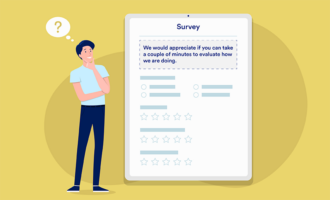























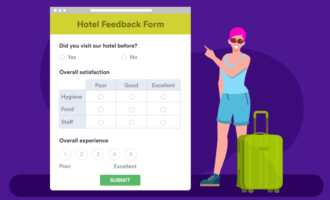





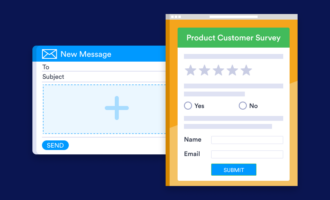

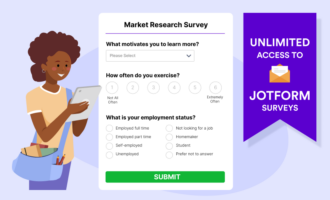






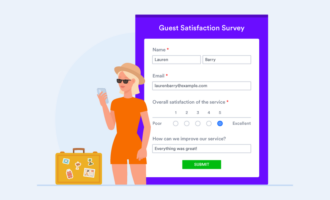



















Send Comment: